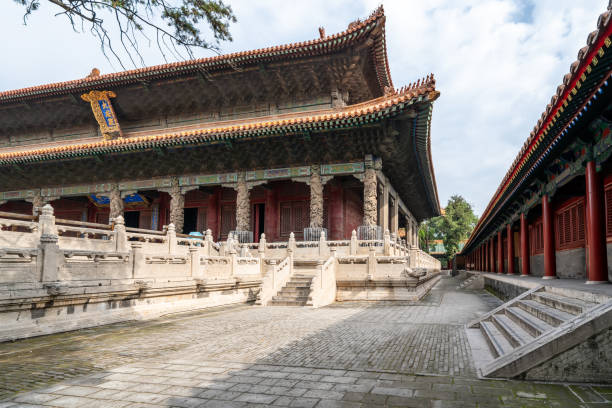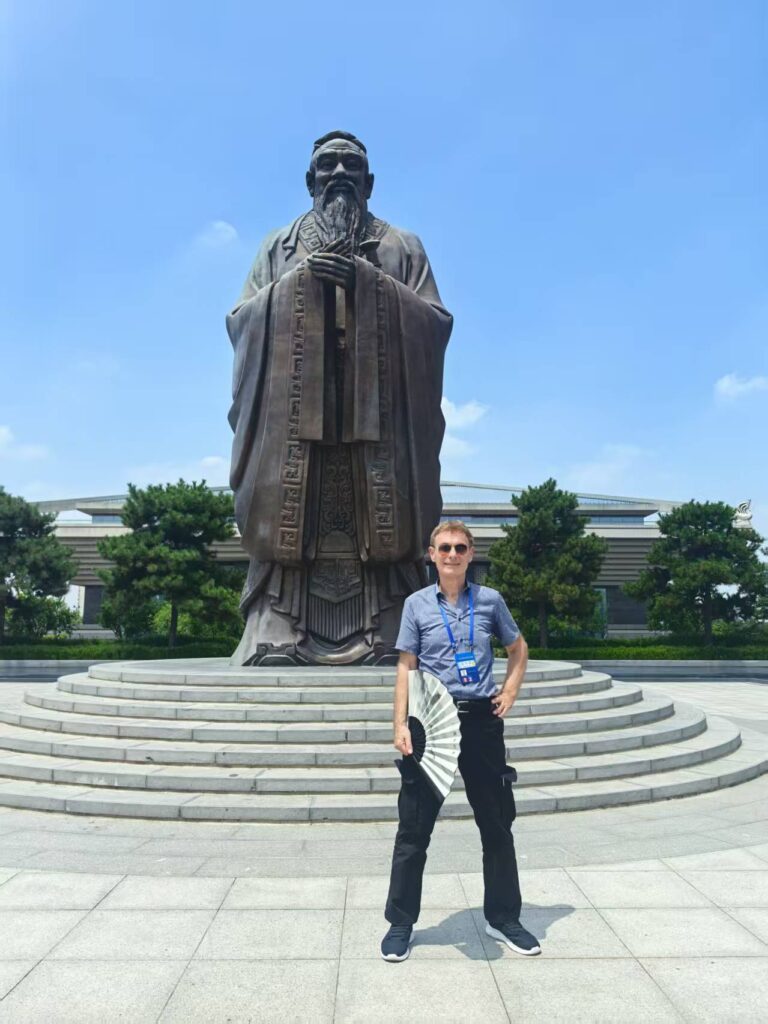Posted on 25th July, 2025 in Blog posts
Confucius’ birthplace, QuFu

In July 2025 I joined several hundred scholars and writers at the Nishan 泥山Conference in Qufu曲阜, the birthplace of Confucius, to discuss the meaning of modernization today. I was accompanied by my former (Goldsmiths) student, Qiu Ling 邱凌, now head of the Department of Journalism at Shandong University, one of China’s best, and where at least two of my favourite writers, Lao She 老舍and Shen Congwen 沈从文, taught in the 1940s. I gave a short talk, and here it is.

Qufu Confucius Temple and Confucius Mansion tourist area
Confucianism & Modernization
In London in 2017 friends and I established Europe’s first bilingual Chinese English school, Kensington Wade. It was named after Thomas Wade, the Anglo-Irish diplomat who created Cambridge University’s library of the Chinese classics and became its first Professor of Chinese. We set up Kensington Wade because we believe that Anglophone children can only be fit for the modern world if they have understood the key ideas of Chinese culture.
Our pupils include every kind of European, but, as far as I am concerned the West is a nebulous concept, whereas the Anglosphere – UK, Ireland and their derivatives, Canada, Australia, New Zealand and the USA – quite clearly share many characteristics. I shall therefore talk about China in relation to the Anglosphere.
But now, another definition: What do we mean by modernization today?
China has essentially achieved what reformers set out to do, when faced with the challenge from Great Britain, nearly 200 years ago: 富国强兵, a country able to feed and defend itself. And in almost all material areas of human activity China can be regarded as modernised.
The domestic issues that remain to be solved in either Sinosphere or Anglosphere include demography, employment, education, care of the elderly, inequality and so on. They are serious, but ‘modernizing’ in this context means mainly to continue along current policy lines.
Today modernization does not mean changes in the material conditions but it means philosophical and psychological adaptation to enable us to work together in order to face up to global issues.
It is urgent that the nations of the world, in particular the biggest nations or grouping of nations work together, collaborate on the existential issues facing all humankind. These include:
• Climate change
• Terrorism inspired by religion or ideology
• Environmental degradation
• NBC proliferation
• Failing states whose people flee, disrupting other countries
• AI and the future of human purpose.
The impediments to collaboration are philosophical or ideological. Let me explain.
Historians have long agreed that the protestant reformation in Europe, by democratising literacy and the habit of doubt and inquiry, motivated and mobilised enterprise and expansion, giving rise to the European enlightenment, the scientific and industrial revolutions, and the spreading of pragmatism and realism around the world. This was the benign contribution from one aspect of the Christian religion.
Jesus Christ was a great Jewish charismatic who fiercely opposed the religious establishment (the church) of his day and directed the attention of ordinary people to moral values which he thought reflected ‘God’s way 道’ if you will forgive me mixing Jewish and Chinese concepts.
But the churches which claimed to promulgate those values had a dark side. Monotheism (the belief that there is only 1 God and he knows everything) bundled the belief that no other way of looking at the world had value. For the Christian churches – if not for Christ himself, who had a very local focus – their dogmas were universal and superior. Other ways of life were evil and to be overcome.
Monotheism’s secularised forms, communism and fascism, were also, in the 20th century, deployed by power hungry and aggressive men to shut out competing ideas and to extirpate different cultures.
The monotheists’ other main assertion, that human beings are lords of the universe rather than products of nature, may have been inspiring in the past, but is dysfunctional today.
The Chinese enlightenment of 500 BC situated humanity within, not above, nature and is more in tune with what science has since told us about the evolution of our world, more apt for unifying humanity and for dealing with the environment.
Today, some powerful politicians in the Anglosphere draw upon traditions of monotheist intolerance to claim a mission to impose moral authority over those they perceive as rivals. Other politicians who hold to the same beliefs but lack the military or economic power to impose them, are dogmatic about values and condemn other countries which they claim do not meet their ‘universal’ standards. Mutual respect, an essential foundation of cooperation, is impossible.
For about 100 years, Chinese modernizers adopted the monotheist mentality. Sun Yatsen 孙中山and Chiang Kaishek 蒋介石 were among many Chinese who thought that Christianity should replace what they and their contemporaries feared was a debilitating Chinese tradition. Other Chinese adopted socialism, fascism, and of course, Russian communism.
It was not until the coming to power of Deng Xiaoping in the 1980s, that China started to ask itself whether western ideas really are better than China’s own wisdom. Deng Xiaoping condemned what he called modern superstition. 现代迷信
In the 1980s many young Chinese thought they wanted Western liberalism, but, by the 2000s there began a restitution of what is called popularly Confucianism but is, in reality, an amalgam of the nostrums of Confucius, Mencius and Laotzu. In their simplest daily form they emphasise
1. The primacy of human relationships and membership of communities.
2. That the educated and enlightenment person declines to waste time on superstitions
3. That we human beings, as products of nature, can find the origins of our moral instincts in nature, not in gods
4. That the only possible immortality is genetic immortality, through the family.
5. That we must pay attention to the ecology of the world because we are an integral part of our environment.
China’s great advantage today is that its people have an essentially pragmatic and empirical approach to life and that it is proving easy for Chinese to slough off the monotheist superstitions learnt over the past 200 years.
Unfortunately, many in the Anglosphere have not grown out of monotheism; the church tradition has transmuted into the ideology which we can call human rightsism, which, though it has benevolent aspects, can operate as a new kind of cultural imperialism.
China’s modernization of thought is proceeding more easily because Chinese people, notwithstanding the attacks of the last 100 years, are still saturated with the ideas of the Chinese Enlightenment. However, the Anglophone world, because of its monotheist inheritance, has much greater difficulty in accepting the equality of systems, the need for collaboration with diversity.
I am not advocating a rejection of traditional religions: There is no reason why those who take comfort from ancient stories that give their lives meaning, should not continue to practice them. And where the stories a church has told play an important part in the cultural life of a nation, they should be treasured as great symbolic myths.
But the educated classes and the ruling elites should abjure superstitions of self-righteousness and exceptionalism. They must not claim universality for their own dogmas. No god has made any nation his chosen people.
In London, I hope that our little pupils at Kensington Wade learn the humane teachings of both Jesus Christ and the Chinese sages, unmediated by authoritarian institutions. Only when we have melded these two wisdoms will we be modern.
Qufu Confucius Temple and Confucius Mansion tourist area
